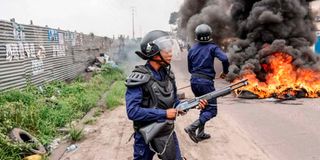Prime
DRC opposition calls for protests ahead of President Tshisekedi's inauguration

Democratic Republic of Congo olice officers stand next to a burning barricade during demonstrations by Opposition supporters in Kinshasa on December 27, 2023.
What you need to know:
- More than 40 million people out of the 100 million inhabitants of the vast country were registered to vote on December 20 for a president.
- Voting was officially extended by a day to account for problems, and continued for days afterwards in remote areas.
Three of the defeated presidential candidates in last month's DR Congo election have asked supporters to "show their discontent" on Saturday when President Felix Tshisekedi takes office for a second term.
The three contenders -- Moise Katumbi, a former governor of the central Katanga region and a prominent businessman; Martin Fayulu, who says he was robbed of the last presidential election in 2018; and Floribert Anzuluni -- did not, however, call for rallies or marches.
Instead, they exhorted people "to show their discontent, to stand up and say 'no'" from wherever they happened to be, in a joint video press conference on Thursday.
Tshisekedi's investiture is due to take place at a giant stadium in the capital of the Democratic Republic of Congo, Kinshasa.
More than 40 million people out of the 100 million inhabitants of the vast country were registered to vote on December 20 for a president, as well as for national and regional lawmakers and municipal councillors.
Voting was officially extended by a day to account for problems, and continued for days afterwards in remote areas, according to observers.
The opposition had called a rally on December 27 but it was banned by the authorities and nipped in the bud by the police.
"We have stopped mass action, we cannot send people to the slaughterhouse," Fayulu said during the video press conference.
"All the Congolese have realised that this was a farce," he added, referring to the election.
Tshisekedi got 73.47 percent of the vote, according to the final results. Katumbi was a distant second at 18.08 percent, Fayulu garnered about five percent, while Anzuluni got less than one percent.
On Christmas Eve, the archbishop of Kinshasa denounced the elections as a "gigantic, organised mess".
Tshisekedi, 60, first came to power in the DRC in January 2019 after a disputed election that many observers said he had in fact lost.





